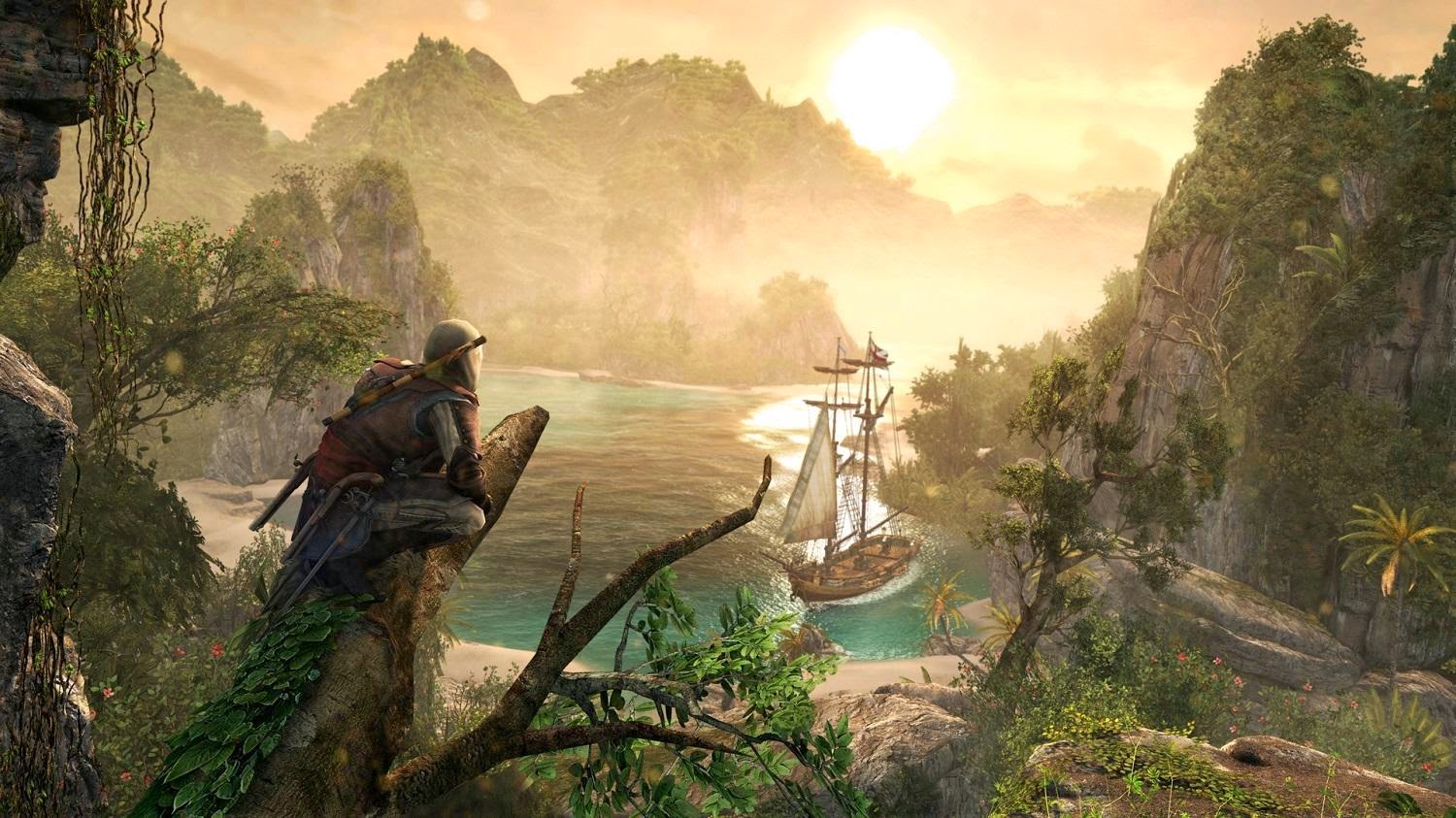Assassin's Creed IV: Black Flag Review
Live by the mead.
Game review by Isaac Handelman
Note: Reviewed on PC
Note: Reviewed on PC
Assassin’s Creed IV: Black Flag can be compared, in many ways, to its protagonist, Edward Kenway. The game is big, bold, sometimes brash, and in constant pursuit of greatness. Black Flag is also enormous, constantly beautiful, and full of new ideas. Unfortunately, it also often forgets to address mechanical and structural issues that have plagued the series since its inception. Black Flag feels like two games in one, as if Ubisoft was aiming to test the waters (so to speak) of the pirate sub-genre under the safety of the Assassin’s Creed brand. The result is a game that can be most aptly described as a jack of all trades, master of none.
The Assassin’s Creed series has, at its core, always been about two things: climbing and stabbing. In Black Flag, these two ingrained elements are further refined. Free-running around the sunny port cities of the Carribbean, Nassau and Kingston, is smoother than it’s ever been. Edward’s gotten a subtle but noticeable movement upgrade that makes his actions feel more fluid and natural than ever. His animations while gliding up walls and over rooftops are incredibly detailed and feel tailored to almost every possible free-running situation Edward could get himself into. The result is a free-running experience that feels all at once tighter than ever before, and yet also far more adaptive to the actions of the player. That’s not to say that the system can’t be finicky; I found myself unintentionally leaping into harm’s way on more than one occasion. However, when held up against competing free-running systems, Assassin’s Creed still comes out on top.
Many have criticized Assassin’s Creed’s combat for being overly simplistic and lacking in challenge, and those who don’t find enjoyment in the fighting system of the series probably won’t be converted by the changes Black Flag makes. Players who can get past the relative simplicity of combat will find a fast, fluid, and enjoyable experience. Edward feels more nimble in battle than past AC protagonists, thanks largely to the addition of a time slow-down mechanic that allows the player to choose what fate awaits enemies on the spot. After successfully parrying an incoming attack (with the window to do so being as large and forgiving as it’s ever been), Edward can choose to either throw, hold, or execute the enemy. This small change helps make the player feel more in control of the assassin’s actions during combat sequences, though it’s far from the overhaul many are hoping for from this department of the series. And although Black Flag is, impressively, a mostly bug-free experience, the game is rough around the edges with its combat animations, with some blows failing to come into contact with enemies, which results in Edward swiping at air while his enemies magically fall to the ground, dead.
The other half of the stab-centric gameplay is stealth, and this system is as unreliable as it always is in the Assassin's Creed series. Though the addition of large amounts of shrubbery gives Edward more flexibility in his hiding spaces, the enemy AI is quite unreliable. Some enemies failed to notice my incredibly obvious "stealth" assassinations of their brethren, while others, namely rooftop guards, have unforgiving eagle eyes that dissuade experimentation, leaving few options but to gun them down before advancing.
These two primary gameplay elements are joined, this time around, by the addition of a third major facet: sailing. Edward commandeers the Jackdaw, a large, nimble, upgradeable vessel with commendable offensive capabilities. Setting off from ports into the open sea is thrilling, made moreso by the game's sweeping score which rivals the high quality of AC2's orchestral compositions. Black Flag does a solid job of making its world feel interconnected, which ensures that exploration is engaging...at first. Soon enough, I tired of the monotony of AC4’s side-objectives; the simple act of sailing is satisfying, and is bolstered by the addition of authentic-sounding sea-shanties bellowed out by the Jackdaw’s crew, but regardless, I soon found myself utilizing the game’s fast travel system on a fairly regular basis.
Part of the issue here is the sheer size of AC4’s world. The game world is absolutely massive, to the point where it becomes overwhelming. It may sound contrary to the popular belief that you can never have too much of a good thing, but there is simply too much to do in Assassin’s Creed IV. The side activities soon reveal themselves to be less-than-engaging, often repeating similar formulas ad nauseum, spread out to require minutes of in-game travel time simply to reach them, sometimes even with the use of fast travel. Despite the initially intoxicating size of the world, Black Flag could have easily benefitted from a smaller, denser environment chock full of a smaller number of more diverse distractions.
Still, it's difficult to deny how impressive it is that such an enormous game looks as beautiful as Black Flag does; with stunning lighting and water effects and beautifully realized environments, this game is a sight to behold at almost every moment, although you'll need a beefy gaming rig if you hope to max the game's graphical settings, as its PC optimization borders on awful.
The ship-on-ship combat options do initially help to ease the tedium of sailing. The Jackdaw is well-armed, and taking on rival buccaneers and Spanish vessels on the high seas is thrilling. There's a definite sense of impact associated with the naval combat that makes each encounter tense. Though boarding ships remains exciting throughout the entirety of the adventure, the ship-on-ship fights required in order to board other vessels grow tiresome. As the game continues, the appeal of naval combat wavers as its true lack of depth becomes apparent. Once its initial novelty has worn off, this element becomes a game of "try to get out of range of enemy fire, brace, return fire, repeat." I was desyncronized just a single time on the high seas, highlighting the lack of challenge associated with the naval combat alongside its monotony.
Each of these disparate elements plays a part in the story of Edward Kenway, a brash young privateer-turned-pirate-turned-quasi-assassin. Kenway's story takes itself less seriously than that of much-maligned AC3 protagonist Connor, and the change of tone is a welcome one. Edward's quest to find a fabled ancient location called The Observatory is simplistic when compared to the grand political schemings of the Ezio trilogy, but it's quite entertaining and is a perfect fit for the game's swashbuckling atmosphere.
When the story takes time to actually delve into the Assassin/Templar conflict, it's decidedly less consistent. Edward's "transformation" into an assassin feels incredibly bare-bones and constantly plays second fiddle to the pirate adventuring, which is odd for a game called "Assassin's Creed." The protagonist is never formally accepted into the Assassin brotherhood, and players have the option of taking Templar assassination contracts before Edward even knows about the assassins' existence. This bizarre continuity error makes even more apparent the main foible of Black Flag: it bares the Assassin's Creed name, and yet often feels disinterested in actually being an Assassin's Creed game.
Thankfully, another staple of the Assassin's Creed series is present, and in fine form: the modern-day segments. After the horribly unfulfilling conclusion to Desmond Miles' arc, Black Flag places players in the shoes of an anonymous Abstergo Entertainment employee for these sections of the game. Players explore a beautifully realized, pseudo-futuristic Abstergo facility, solving fairly straightforward puzzles, uncovering clever Easter eggs, meeting a few familiar returning faces, and engaging in a surprisingly compelling if rather small-scale tale of devious corporate espionage.
Assassin's Creed IV: Black Flag is a decent pirate game mixed with a decent Assassin's Creed game, and the result, rather than being additive to greatness, is merely decent. The story is an engaging yarn, both inside the Animus and out, and the gameplay staples that have always been present to make Assassin's Creed an enjoyable series are further refined here. The problem is that Black Flag feels more intent on adding in a myriad of new elements to the mix rather than fixing what's needed fixing for a few games now. Those who have been yearning for a solid AAA pirate game since the days of Sid Meier's Pirates! will likely be entertained, as will Assassin's Creed diehards. Others are advised to hold off and wait for this series to find its footing -- preferably on solid ground rather than the deck of a ship.







Comments
Post a Comment